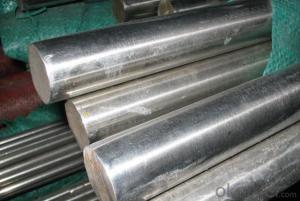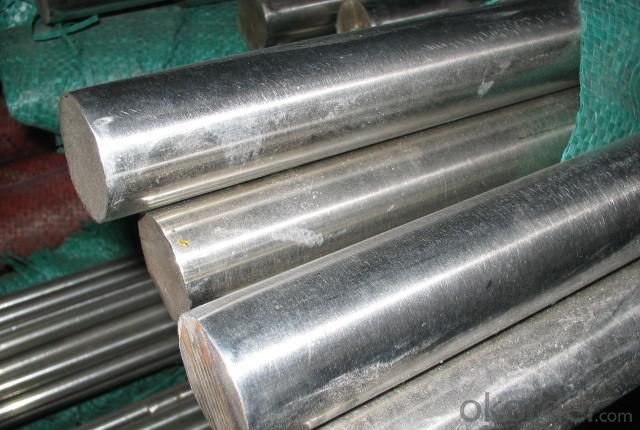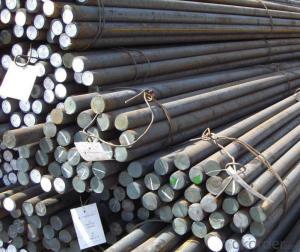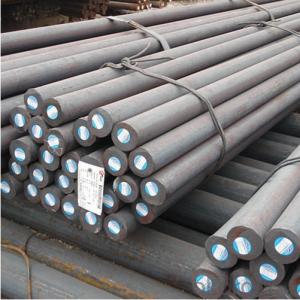Alloy Steel 40Mn Round Bar CNBM 16MM-300MM
- Loading Port:
- Shanghai
- Payment Terms:
- TT or LC
- Min Order Qty:
- 25 m.t.
- Supply Capability:
- 500000 m.t./month
OKorder Service Pledge
OKorder Financial Service
You Might Also Like
Specification
Alloy round steel bar 40Mn
Product Description
1. Sizes: Diameter: 16mm-300mm; Length: 6m, 9m, 12m
2. Grade: 40Mn
3. Invoicing on theoretical weight or actual weight as customer’s request
4. Shape: Round bar, solid bar of steel with circular section
5. Technique: Hot rolled, forged, cold rolled
Specification:
Material | 40Mn | Round bar | Dia(mm) | 16-600 |
Process | EAF + LF + VD + Forged + Heat Treatment (optional) | Length (mm) | Max 12000 | |
Heat treatment | Normalized / Annealed / Quenched / tempered | Flat bar | Thickness(mm) | 8-500 |
Delivery condition | Hot forged +Rough machined (black surface after Q/T)+ Turned (optional) | Width(mm) | 70-200 | |
Test | Ultrasonic test according to SEP 1921-84 D/d | Length (mm) | Max 12000 |
Chemical Composition
C | Si | Mn | Cr | Ni | Cu |
0.5~0.8 | 0.17~0.37 | 0.25~1.2 | ≤0.25 | ≤0.30 | ≤0.25 |
Packing and Delivery:
Packing in bundle with steel strips and shipped by break bulk vessel or container (depend on target market and different ports)
Delivery Detail: Approx.45 days
Usage and Applications
1. Steel round bar is used in a large number of architectural and engineering structures. Or it can be used in construction of plants for the production of steel house frames, high-voltage transmission towers, bridges, vehicles, boilers, containers, ships, etc.
2. And we can use this kind of product on the performance of the mechanical parts if the demand is not very high.
3. Some especial material steel round bar can be used for main shaft of steamer, hummer shank, with big section and supper force.
Product Show
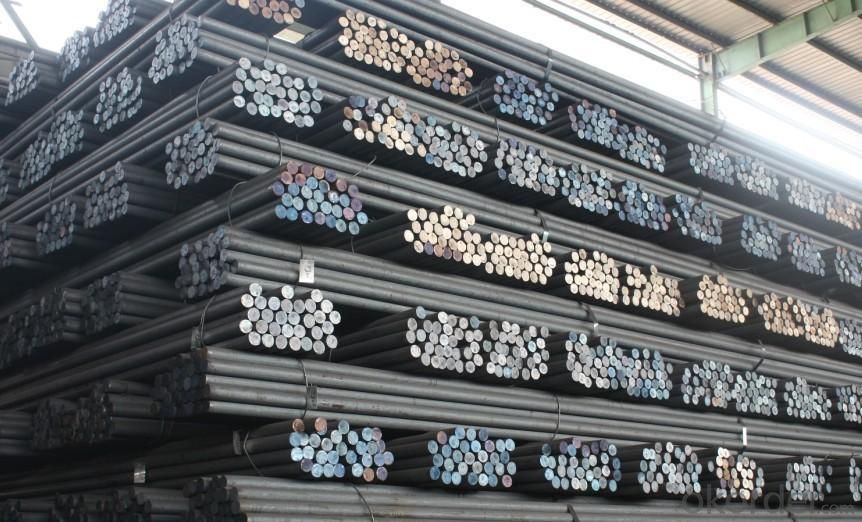
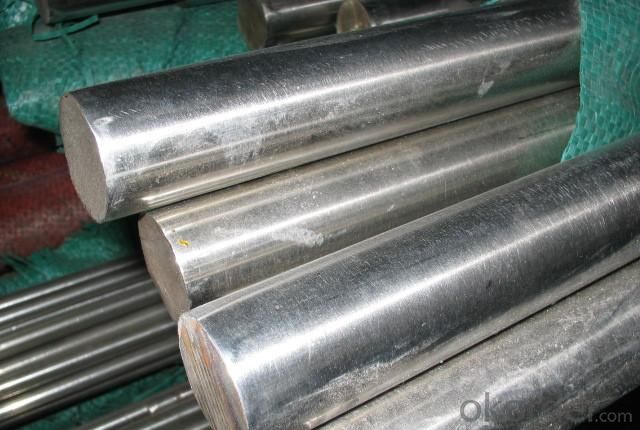
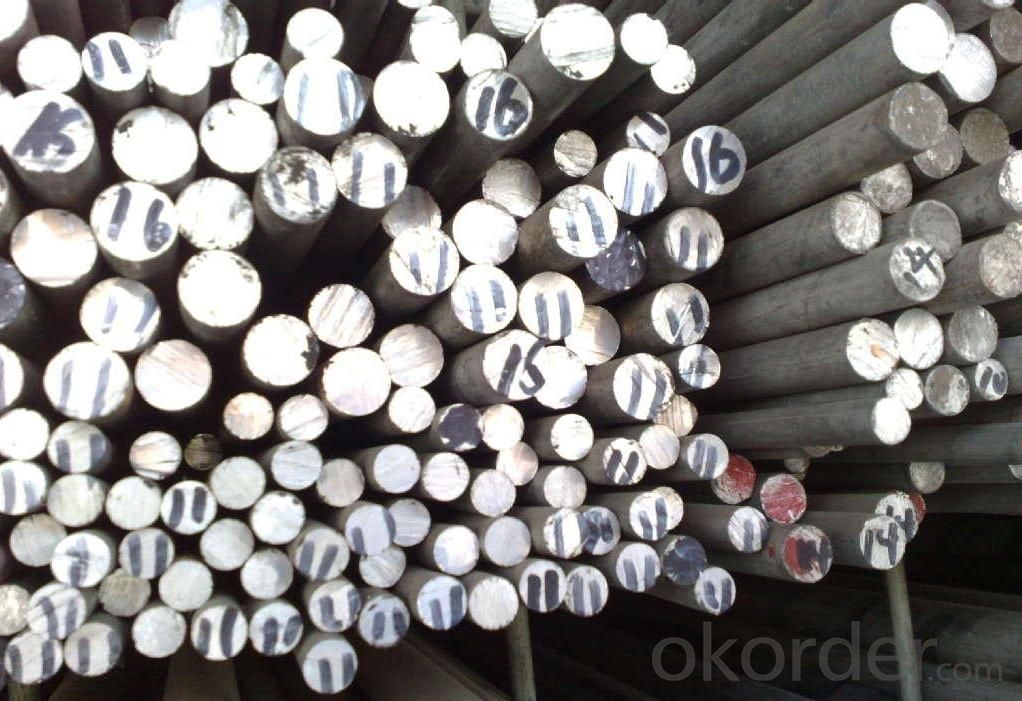
- Q: What are the different methods of preventing pitting corrosion in special steel?
- Various methods exist to prevent pitting corrosion in special steel. The objective of these techniques is to safeguard the steel surface from the harmful effects of its environment and hinder the development of pits. Some commonly used methods include: 1. Passivation: Passivation entails treating the steel surface with a chemical solution or coating to generate a protective oxide layer. This layer functions as a barrier, obstructing the infiltration of corrosive agents and minimizing the risk of pitting corrosion. 2. Alloying: By incorporating specific alloying elements into the steel composition, its resistance to corrosion can be enhanced. Elements like chromium, nickel, and molybdenum are frequently utilized as they augment the steel's capacity to form a stable passive film and withstand pitting corrosion. 3. Cathodic protection: This technique involves either utilizing a sacrificial anode or employing an impressed current on the steel surface. By making the steel cathodic, it becomes less prone to corrosion as electrons are drawn away from it, thus preventing pit formation. 4. Coatings: Applying a protective coating to the steel surface can effectively deter pitting corrosion. Coatings such as paint, epoxy, or polymer-based materials serve as physical barriers, shielding the steel against corrosive agents. 5. Environmental control: Regulating the surrounding environment of the steel can also assist in preventing pitting corrosion. This encompasses measures like controlling temperature, humidity, and pH levels to ensure they remain within acceptable limits, thereby inhibiting the corrosion process. 6. Regular maintenance: Consistent inspection and maintenance of the steel surface are vital in preventing pitting corrosion. Any signs of damage or deterioration should be promptly addressed to prevent further corrosion and potential pitting. It should be noted that the choice of prevention method relies on various factors such as the specific steel composition, the corrosive environment, and the intended application. Proper selection and implementation of these methods can significantly enhance the resilience of special steel to pitting corrosion, guaranteeing its longevity and performance.
- Q: What are the different cutting tools used for special steel?
- There are several different cutting tools that are commonly used for special steel applications. These tools are specifically designed to handle the unique properties and characteristics of special steel, which often requires more precise and specialized cutting techniques. Some of the most commonly used cutting tools for special steel include: 1. Carbide tipped saw blades: These saw blades have carbide teeth, which are extremely hard and durable. They can cut through special steel with ease, providing clean and accurate cuts. 2. High-speed steel (HSS) cutting tools: HSS cutting tools are made from a type of tool steel that can withstand high temperatures and maintain their hardness. These tools are commonly used for drilling, milling, and turning operations on special steel. 3. Diamond cutting tools: Diamond is one of the hardest materials known to man, making it ideal for cutting through tough materials like special steel. Diamond cutting tools, such as diamond-coated saw blades or grinding wheels, are commonly used in special steel applications. 4. Waterjet cutting machines: Waterjet cutting machines use a high-pressure stream of water mixed with abrasive particles to cut through special steel. This method is particularly suitable for complex shapes and intricate designs. 5. Plasma cutting machines: Plasma cutting machines use a high-velocity jet of ionized gas to cut through special steel. This method is often used for cutting thick sections of special steel quickly and efficiently. 6. Laser cutting machines: Laser cutting machines use a highly focused laser beam to cut through special steel. This method offers high precision and can be used to cut complex shapes and patterns. It is important to choose the appropriate cutting tool based on the specific requirements of the special steel being worked with, as well as the desired cutting method and application. Consulting with a specialist or referring to the manufacturer's recommendations can help ensure the best cutting tool is selected for the job.
- Q: How is special steel used in the production of turbine blades?
- Special steel is used in the production of turbine blades due to its exceptional properties such as high strength, corrosion resistance, and heat resistance. These blades must withstand extreme conditions, including high temperatures and pressures, as well as rotational forces. Special steel provides the necessary strength and durability to ensure the blades can effectively convert kinetic energy into mechanical power.
- Q: What are the different types of free-cutting steel?
- There are several different types of free-cutting steel, including leaded steels, sulfurized steels, and phosphorized steels. These types of steels are specifically designed to improve machinability and enhance the cutting performance during manufacturing processes.
- Q: What are the different methods for improving the corrosion resistance of stainless special steel?
- There are several methods for improving the corrosion resistance of stainless special steel. Some of the common methods include alloying the steel with elements such as chromium, nickel, and molybdenum, which enhance its resistance to corrosion. Another method is passivation, which involves treating the steel with an acid solution to remove any surface contaminants and create a protective oxide layer. Coating the steel with materials like paint, powder coating, or electroplating can also improve its corrosion resistance. Additionally, proper cleaning and maintenance practices, such as regular removal of dirt and debris, can help prevent corrosion and maintain the steel's resistance over time.
- Q: What are the properties of heat-resistant steel?
- Heat-resistant steel has several important properties. First, it has a high melting point, allowing it to withstand extremely high temperatures without melting or losing its structural integrity. Additionally, it exhibits excellent strength and toughness, ensuring that it can withstand mechanical stresses even at elevated temperatures. Heat-resistant steel also possesses good oxidation resistance, preventing it from reacting with oxygen and forming destructive oxides when exposed to high temperatures. Furthermore, it has low thermal expansion, which means it maintains its shape and dimensions even under extreme thermal conditions. Overall, these properties make heat-resistant steel highly suitable for applications involving high temperatures, such as in furnaces, boilers, and aerospace components.
- Q: How is special steel used in the aerospace sector?
- Special steel is extensively used in the aerospace sector due to its unique properties that make it suitable for various applications. One of the primary uses of special steel in the aerospace industry is for manufacturing aircraft engine components. These components, such as turbine blades, shafts, and casings, are subjected to extremely high temperatures, pressures, and stresses. Special steel, with its excellent heat resistance, high strength, and superior mechanical properties, enables these engine parts to withstand such harsh conditions, ensuring optimal performance and safety. Moreover, special steel is also utilized in the construction of aircraft structures, including wings, fuselage, landing gears, and other critical components. These structures need to be lightweight, yet strong enough to withstand the forces experienced during flight. Special steel alloys, such as stainless steel, are used to achieve this balance by providing excellent strength-to-weight ratios and corrosion resistance. Additionally, special steel finds application in aerospace fasteners, such as bolts, nuts, and screws. These fasteners must have exceptional strength and durability to ensure the structural integrity of the aircraft. Special steel alloys, like titanium alloys, are commonly used in this regard due to their lightweight nature, high strength, and resistance to corrosion. Furthermore, special steel is utilized in the production of aerospace tooling and equipment. These tools, such as molds, dies, jigs, and fixtures, need to be robust, wear-resistant, and capable of withstanding high temperatures and pressures during manufacturing processes. Special steel, with its excellent hardness, toughness, and heat resistance, makes it ideal for such applications. In summary, special steel plays a critical role in the aerospace sector by providing the necessary properties required for aircraft engine components, structures, fasteners, and tooling. Its unique characteristics of high strength, heat resistance, lightweight, and corrosion resistance make it an indispensable material in the production of reliable and high-performance aerospace systems.
- Q: What are the different construction grades of special steel?
- There are several different construction grades of special steel that are used in various industries and applications. These grades are specifically designed to provide superior strength, durability, and resistance to corrosion and other environmental factors. Some of the commonly known construction grades of special steel include: 1. Mild Steel: This is the most basic and widely used grade of special steel in construction. It has a low carbon content, making it easy to work with and weld. Mild steel is suitable for applications that require moderate strength and durability. 2. High-Strength Low-Alloy (HSLA) Steel: HSLA steel is a type of special steel that contains small amounts of alloying elements, such as copper, nickel, and vanadium. This grade offers higher strength and improved formability compared to mild steel. It is commonly used in structural applications where a higher strength-to-weight ratio is required. 3. Weathering Steel: Also known as Cor-Ten steel, weathering steel is a special grade that forms a protective layer of rust when exposed to the elements. This layer acts as a barrier against further corrosion, making it ideal for outdoor structures. Weathering steel is commonly used in bridges, buildings, and other architectural applications. 4. Stainless Steel: Stainless steel is a corrosion-resistant alloy that contains a minimum of 10.5% chromium. It offers excellent resistance to corrosion, heat, and chemicals, making it suitable for a wide range of construction applications. Stainless steel is commonly used in building facades, roofing, and structural components. 5. Tool Steel: Tool steel is a special grade that is specifically designed for making tools, dies, and molds. It has high hardness, wear resistance, and toughness properties, making it suitable for applications that require cutting, shaping, and forming of materials. 6. Alloy Steel: Alloy steel is a special grade that contains additional alloying elements, such as manganese, silicon, nickel, and chromium. This grade offers improved strength, toughness, and wear resistance compared to carbon steel. Alloy steel is commonly used in the construction of machinery, equipment, and components subjected to high stress and wear. These are just a few examples of the different construction grades of special steel. Each grade has its own unique properties and is chosen based on the specific requirements of the application.
- Q: What are the requirements for special steel used in power generation equipment manufacturing?
- The standards for manufacturing special steel used in power generation equipment are very strict. The steel must be incredibly strong and durable in order to withstand the extreme conditions and heavy loads that power generation equipment experiences. This includes the ability to handle high temperatures, pressure, and mechanical stress. In addition to these requirements, the steel used in power generation equipment must also have excellent resistance to corrosion and oxidation. Since power generation equipment often operates in challenging environments, such as high humidity or exposure to corrosive substances, the steel must be highly resistant to ensure it lasts a long time and performs well. Furthermore, the steel used in power generation equipment must be easy to weld and shape. This is important for the manufacturing process, as power generation equipment often requires complex shapes and structures. The ability to accurately weld and shape the steel is essential. Another important requirement is the steel's ability to maintain its mechanical properties at high temperatures. Power generation equipment, like boilers or turbines, operates at elevated temperatures, and the steel used must retain its strength, resistance to deformation, and dimensional stability under these conditions. Finally, the special steel used in power generation equipment must meet industry standards and specifications. These standards ensure that the steel used in manufacturing is of high quality, reliable, and safe. Compliance with these standards is crucial to ensure the equipment performs well and lasts a long time. Overall, the requirements for special steel used in power generation equipment manufacturing are demanding. The steel must be strong, durable, resistant to corrosion and oxidation, easy to weld and shape, able to withstand high temperatures, and compliant with industry standards. Meeting these requirements is vital for the efficient and reliable operation of power generation equipment.
- Q: What are the different methods of preventing stress corrosion cracking in special steel?
- There are several methods that can be employed to prevent stress corrosion cracking in special steel: 1. Material Selection: Choosing the appropriate steel alloy with enhanced resistance to stress corrosion cracking is crucial. Alloys such as stainless steel, duplex stainless steel, and nickel-based alloys are known for their resistance to this type of corrosion. 2. Surface Treatments: Applying surface treatments like passivation or electroplating can create a protective layer on the steel surface, preventing the entry of corrosive substances and reducing the likelihood of stress corrosion cracking. 3. Stress Relieving: Heat treatment processes like stress relieving can be employed to reduce residual stresses in the steel, which can contribute to stress corrosion cracking. This treatment involves heating the steel to a specific temperature and then slowly cooling it, which helps to minimize the presence of residual stresses. 4. Corrosion Inhibitors: The use of corrosion inhibitors can help to protect the steel from corrosive environments. These inhibitors can be added to the system or applied as a coating on the steel surface, creating a barrier that prevents the corrosive substances from reaching the steel. 5. Environmental Control: Controlling the environment in which the steel is exposed is essential for preventing stress corrosion cracking. Factors such as temperature, humidity, and the presence of corrosive substances should be monitored and controlled to minimize the risk of stress corrosion cracking. 6. Cathodic Protection: Utilizing cathodic protection techniques can help to prevent stress corrosion cracking. This method involves applying a sacrificial or impressed current to the steel, which acts as a cathode and protects the steel from corrosion. 7. Design Considerations: Proper design of the steel structure is crucial in preventing stress corrosion cracking. Factors such as avoiding sharp corners, minimizing stress concentrations, and providing adequate drainage to prevent the accumulation of corrosive substances can significantly reduce the risk of stress corrosion cracking. By employing a combination of these methods, it is possible to effectively prevent stress corrosion cracking in special steel and ensure the longevity and integrity of the structure.
Send your message to us
Alloy Steel 40Mn Round Bar CNBM 16MM-300MM
- Loading Port:
- Shanghai
- Payment Terms:
- TT or LC
- Min Order Qty:
- 25 m.t.
- Supply Capability:
- 500000 m.t./month
OKorder Service Pledge
OKorder Financial Service
Similar products
Hot products
Hot Searches
Related keywords
